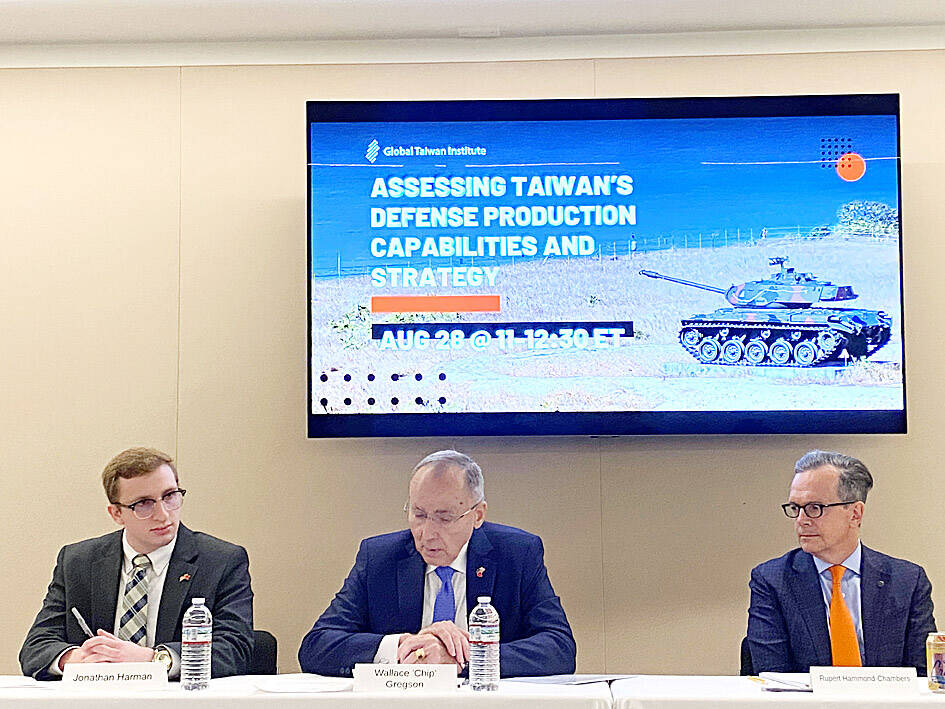Washington remains “committed” to Taiwan’s security, but it has not done enough to support the “modernization” of Taiwan’s military in the face of evolving threats posed by China, the US-Taiwan Business Council said on Tuesday.
“The [US President Joe] Biden administration appears to remain committed to a steady cadence of Taiwan security assistance,” council president Rupert Hammond-Chambers was quoted as saying in a statement.
Speaking in response to an announcement on Tuesday by the US Department of Defense that the US Department of State had approved the sale of military goods and services to Taiwan worth about US$228 million, Rupert Hammond-Chambers said it continues a “consistent trend” over the past four years of the Biden administration providing military equipment in “relatively small-value tranches.”

Photo: CNA
The US Defense Security Cooperation Agency said in a separate statement that the state department “made a determination approving a possible foreign military sale” to the Taipei Economic and Cultural Representative Office in the US for “return, repair and reshipment of spare parts and related equipment.”
In Taipei, the Ministry of National Defense said that the sale — the 16th foreign military sale from the US since 2020 — would be useful to “maintain the combat readiness and safety of air force equipment.”
However, despite the sale, Hammond-Chambers said that Washington’s support for Taiwan’s “force modernization” has been “on hold since 2020.”
The US has a “singular focus” on “bolstering Taiwan’s defense against a kinetic D-Day-style attack,” but such an assault “is not the only challenge that the Taiwan military faces,” he said, referring to the World War II Normandy landings by Allied forces.
“The absence of US support for other areas — including gray zone, blockade and quarantine scenarios — is destabilizing over time,” he said. “Meanwhile, China’s force modernization continues apace.”
The Biden administration appears to “minimize the dollar value of each arms sale” in line with its “global, non-escalatory approach” to conflict zones, including Ukraine and Israel, Hammond-Chambers said.
The approach “harks back to a pre-Trump era” when “greater than US$1 billion Taiwan arms sales were considered overly provocative toward Beijing and therefore to be avoided,” he said, referring to the administration of former US president Donald Trump.
Hammond-Chambers, who was elected president of the council in 2020 after joining the non-profit organization in 1994, has long urged the US to do more to boost Taiwan’s defense preparedness.
In a 2022 article criticizing the US policy of “strict strategic ambiguity” published by the Prospect Foundation, he urged Washington to provide “at least some clarity on when and where the US would be willing to step in,” thereby enabling Taiwan to focus on “a narrower defensive ability” in expectation of the US “filling the gaps” where needed.
Otherwise, in a hypothetical attempt to annex Taiwan, China’s military would be able to “focus on Taiwan’s more narrowly scoped defensive stance,” as the US has seemed reluctant to sell Taiwan the full range of capabilities needed to deter China and defend itself on its own, he said.

Alain Robert, known as the "French Spider-Man," praised Alex Honnold as exceptionally well-prepared after the US climber completed a free solo ascent of Taipei 101 yesterday. Robert said Honnold's ascent of the 508m-tall skyscraper in just more than one-and-a-half hours without using safety ropes or equipment was a remarkable achievement. "This is my life," he said in an interview conducted in French, adding that he liked the feeling of being "on the edge of danger." The 63-year-old Frenchman climbed Taipei 101 using ropes in December 2004, taking about four hours to reach the top. On a one-to-10 scale of difficulty, Robert said Taipei 101

Nipah virus infection is to be officially listed as a category 5 notifiable infectious disease in Taiwan in March, while clinical treatment guidelines are being formulated, the Centers for Disease Control (CDC) said yesterday. With Nipah infections being reported in other countries and considering its relatively high fatality rate, the centers on Jan. 16 announced that it would be listed as a notifiable infectious disease to bolster the nation’s systematic early warning system and increase public awareness, the CDC said. Bangladesh reported four fatal cases last year in separate districts, with three linked to raw date palm sap consumption, CDC Epidemic Intelligence

Taiwanese and US defense groups are collaborating to introduce deployable, semi-autonomous manufacturing systems for drones and components in a boost to the nation’s supply chain resilience. Taiwan’s G-Tech Optroelectronics Corp subsidiary GTOC and the US’ Aerkomm Inc on Friday announced an agreement with fellow US-based Firestorm Lab to adopt the latter’s xCell, a technology featuring 3D printers fitted in 6.1m container units. The systems enable aerial platforms and parts to be produced in high volumes from dispersed nodes capable of rapid redeployment, to minimize the risk of enemy strikes and to meet field requirements, they said. Firestorm chief technology officer Ian Muceus said

MORE FALL: An investigation into one of Xi’s key cronies, part of a broader ‘anti-corruption’ drive, indicates that he might have a deep distrust in the military, an expert said China’s latest military purge underscores systemic risks in its shift from collective leadership to sole rule under Chinese President Xi Jinping (習近平), and could disrupt its chain of command and military capabilities, a national security official said yesterday. If decisionmaking within the Chinese Communist Party has become “irrational” under one-man rule, the Taiwan Strait and the regional situation must be approached with extreme caution, given unforeseen risks, they added. The anonymous official made the remarks as China’s Central Military Commission Vice Chairman Zhang Youxia (張又俠) and Joint Staff Department Chief of Staff Liu Zhenli (劉振立) were reportedly being investigated for suspected “serious